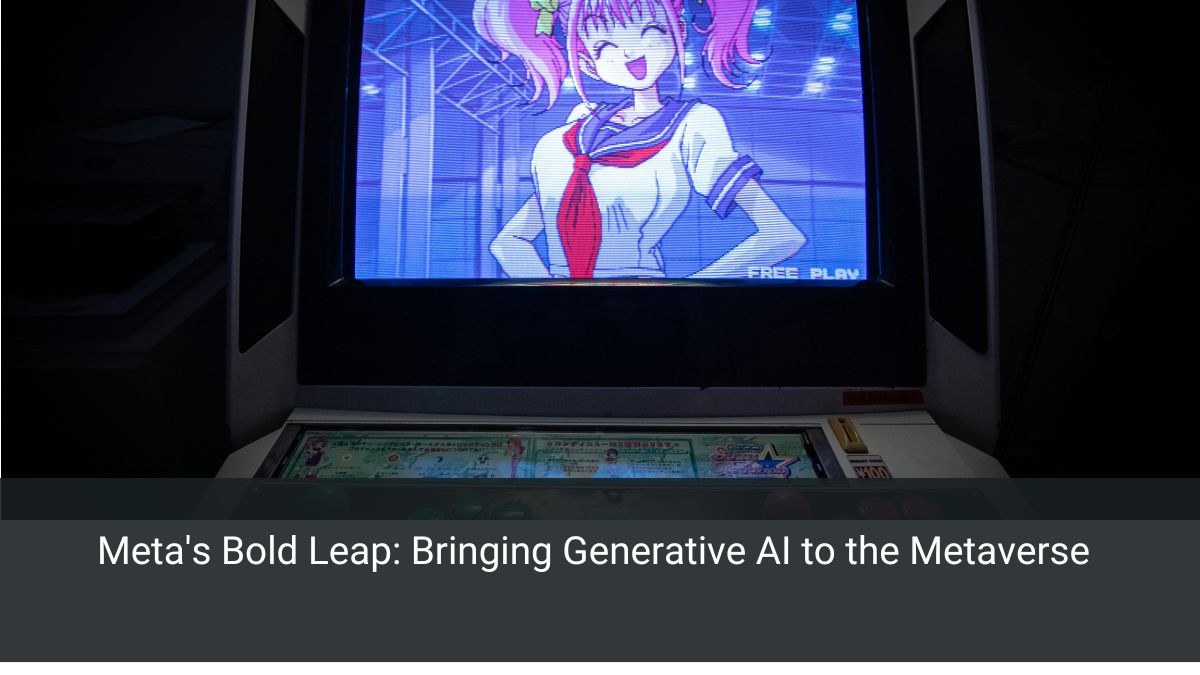AI
Meta’s Bold Leap: Bringing Generative AI to the Metaverse

In the ever-evolving landscape of technology, Meta is making waves once again. The tech giant, formerly known as Facebook, is setting its sights on a groundbreaking fusion: merging generative AI with metaverse gaming. This ambitious move could potentially reshape the future of virtual and augmented reality experiences. Let’s dive into what this means for gamers, developers, and the metaverse at large.
The Vision: AI-Powered Metaverse Games
Meta’s latest job listing has set the tech world abuzz. The company is on the hunt for innovators who can help bring generative AI into the realm of VR, AR, and mixed reality games. But what exactly does this entail?
Dynamic Gameplay Like Never Before
Imagine stepping into a virtual world that’s different every time you visit. That’s the promise of generative AI in gaming. Meta envisions games that follow “non-deterministic” paths, creating unique experiences for each player. It’s a far cry from the scripted narratives we’re used to, offering instead a world of endless possibilities.
As someone who’s spent countless hours replaying favorite games, the idea of a truly dynamic virtual world is thrilling. No more memorizing enemy patterns or dialogue trees – each playthrough could be a brand new adventure.
Horizon: The Testing Ground
Meta’s primary focus for this AI integration will be Horizon, its suite of metaverse apps and games. However, the company isn’t limiting itself. There are hints that this technology could expand to non-Meta platforms, including smartphones and PCs. This broad approach suggests Meta sees generative AI as a transformative force for the entire gaming industry, not just its own ecosystem.
The Challenges Ahead
While the potential is exciting, Meta faces significant hurdles in bringing this vision to life.
Reality Labs’ Struggle for Success
Meta’s Reality Labs division, responsible for the company’s metaverse projects, has yet to produce a blockbuster product. Despite selling millions of Quest headsets, the division has struggled to attract users to its Horizon platform. More concerning are the billions of dollars in operating losses the division has accrued.
The Quest for User Engagement
One of the biggest challenges for Meta will be translating its AI innovations into experiences that users actually want. As someone who’s tried various VR platforms, I can attest that the novelty often wears off quickly. Meta will need to create compelling, lasting experiences to keep users coming back.
A Glimpse into the Future
Despite the challenges, Meta’s vision for AI in the metaverse is captivating. Let’s explore some potential applications:
AI-Generated Worlds
Imagine describing a world you want to explore, and having it materialize before your eyes. Meta’s prototype Builder Bot, showcased in 2022, hinted at this possibility. Users could create virtual environments simply by describing them verbally.
Dynamic NPCs and Storylines
AI could breathe new life into non-player characters (NPCs), making them more responsive and realistic. Conversations could be unique each time, adapting to the player’s choices and actions. Storylines could branch in unexpected ways, creating truly personalized narratives.
Streamlined Development
For developers, generative AI tools could be a game-changer. As Meta CTO Andrew Bosworth noted, these tools could “level the playing field,” giving small teams the capabilities of larger studios. This could lead to an explosion of creativity in the metaverse.
The Broader Impact
Meta’s push into AI-powered metaverse experiences isn’t happening in isolation. It’s part of a larger trend in the gaming industry.
AI in Game Development
Companies like Inworld and Artificial Agency are already applying generative AI to create more dynamic game dialogues and narratives. Tools for generating game art assets and character voices via AI are becoming more common, though not without controversy.
Concerns from Creators
As with any technological shift, there are concerns. Some game creators worry about the impact on their livelihoods as AI takes on more creative tasks. It’s a reminder that as we embrace new technologies, we must also consider their broader societal impacts.
Looking Ahead: The Long Game
Meta’s foray into generative AI for the metaverse is just beginning. Zuckerberg himself has cautioned that it could take “years” for the company to monetize these investments. This suggests that while the potential is enormous, patience will be key.
As we stand on the brink of this new frontier, it’s worth pondering: How will generative AI reshape our virtual experiences? Will it make the metaverse more engaging, more creative, more human? Or will it present new challenges we’ve yet to anticipate?
One thing is certain: the fusion of generative AI and the metaverse is a space to watch closely. It has the potential to not just change how we play games, but how we interact, create, and express ourselves in virtual spaces.
What are your thoughts on this AI-powered future? Are you excited about the possibilities, or do you have concerns? As we journey into this new era of digital experiences, your voice and perspective matter. Let’s continue the conversation and shape the future of the metaverse together.
